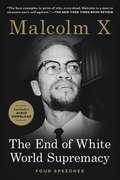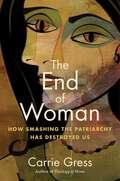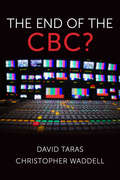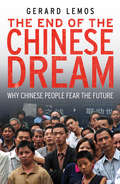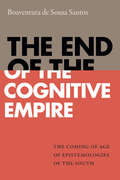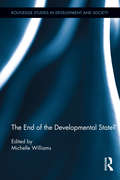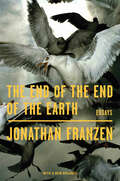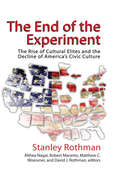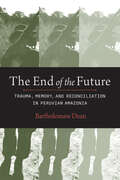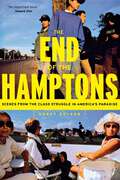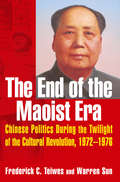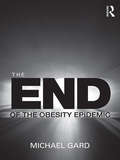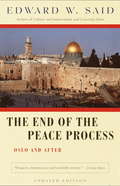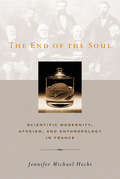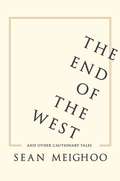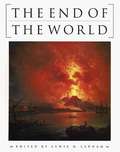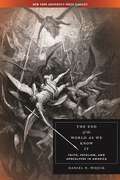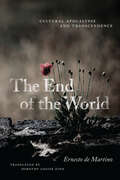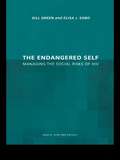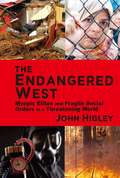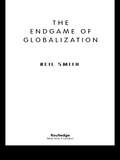- Table View
- List View
The End of White World Supremacy: Four Speeches
by Malcolm XThe classic collection of major speeches, now bundled with an audio download of Malcolm X delivering two of them. Malcolm X remains a touchstone figure for black America and in American culture at large. He gave African Americans not only their consciousness but their history, dignity, and a new pride. No single individual can claim more important responsibility for a social and historical leap forward such as the one sparked in America in the sixties. When, in 1965, Malcolm X was gunned down on the stage of a Harlem theater, America lost one of its most dynamic political thinkers. Yet, as Michael Eric Dyson has observed, &“he remains relevant because he spoke presciently to the issues that matter today: black identity, the politics of black rage, the expression of black dissent, the politics of black power, and the importance of consolidating varieties of expressions within black communities—different ideologies and politics—and bringing them together under a banner of functional solidarity.&” The End of White World Supremacy contains four major speeches by Malcolm X, including: &“Black Man's History,&” &“The Black Revolution,&” &“The Old Negro and the New Negro,&” and the famous &“The Chickens Are Coming Home to Roost&” speech ("God's Judgment of White America"), delivered after the assassination of John F. Kennedy. Several of the speeches include a discussion with the moderator, among whom Adam Clayton Powell, or a question-and-answer with the audience. This new edition bundles with the book an audio download of Malcolm's stirring delivery of &“Black Man's History&” in Harlem's Temple No.7 and &“The Black Revolution&” in the Abyssinian Baptist Church.
The End of Woman: How Smashing the Patriarchy Has Destroyed Us
by Carrie GressFeminism Doesn&’t Empower Women. It Erases Them. The bestselling author of Theology of Home, Carrie Gress shows that fifty years of radical feminism have solidified the primacy of the traditionally male sphere of life and devalued the attributes, virtues, and strengths of women. Feminism, the ideology dedicated to "smashing the patriarchy," has instead made male lives the norm for everyone. After fifty years of radical feminism, we can&’t even define "woman." In this powerful new book, Carrie Gress says what cannot be said: feminism has abolished women. Hulking "trans women" thrash female athletes. Mothers abort their baby girls. Drag queens perform obscene parodies of women. Females are enslaved for men's pleasure—or they enslave themselves. Feminism doesn&’t avert these tragedies; it encourages them. The carefree binge of self-absorption has left women exploited, unhappy, dependent on the state, and at war with men. And still, feminists cling to their illusions of liberation. But there are real answers. Real answers for real women. Carrie Gress—a wife, mother, and philosopher—punctures the myth of feminism, exposing its legacy of abuse, abandonment, and anarchy. From the serpent&’s seduction of Eve to Mary Shelley's Frankenstein to Kate Millett&’s lust, violence, and insanity to Meghan Markle&’s havoc-ridden rise to royalty, Gress presents a history as intriguing as the characters who lived it. The answers women most desperately need, she concludes, are to be found precisely where they are most afraid to look. Only a rediscovery of true womanhood—and motherhood—can pull our society back from the brink. And happiness is possible only if women are open to making peace with men, with children, with God, and—no less difficult—with themselves. For feminism&’s victims, Gress is a welcoming voice in the darkness: The door is open. The lights are on. Come home.
The End of the CBC?
by David Taras Christopher WaddellThe End of the CBC? is about three overlapping crises: the crisis that has enveloped the CBC, the crisis of news, and the crisis of democracy. They are all the result to some degree of the vast changes that have overtaken and consumed the media world in the last ten to fifteen years. The emergence of platforms such as Google, Facebook, Twitter, and Netflix, the hyper-targeting of individual users through data analytics, the development of narrow online identity communities, and the rise of an attention economy that makes it more and more difficult for any but the most powerful media organizations to be noticed, have changed the media landscape in dramatic ways. The effects on the CBC and on other Canadian media organizations have been shattering. Describing the failure of successive governments to address problems faced by the public broadcaster, this book explains how the CBC lost its place in sports, drama, and entertainment. Taras and Waddell propose a way forward for the CBC – one in which the corporation concentrates its resources on news and current affairs and re-establishes a reputation for depth and quality.
The End of the Chinese Dream
by Gerard LemosGlossy television images of happy, industrious, and increasingly prosperous workers show a bright view of life in twenty-first-century China. But behind the officially approved story is a different reality. Preparing this book Gerard Lemos asked hundreds of Chinese men and women living in Chongqing, an industrial mega-city, about their wishes and fears. The lives they describe expose the myth of China's harmonious society. Hundreds of millions of everyday people in China are beleaguered by immense social and health problems as well as personal, family, and financial anxieties—while they watch their communities and traditions being destroyed. Lemos investigates a China beyond the foreigners' beaten track. This is a revealing account of the thoughts and feelings of Chinese people regarding all facets of their lives, from education to health care, unemployment to old age, politics to wealth. Taken together, the stories of these men and women bring to light a broken society, one whose people are frustrated, angry, sad, and often fearful about the circumstances of their lives. The author considers the implications of these findings and analyzes how China's community and social problems threaten the ambitious nation's hopes for a prosperous and cohesive future. Lemos explains why protests will continue and a divided and self-serving leadership will not make people's dreams come true.
The End of the Cognitive Empire: The Coming of Age of Epistemologies of the South
by Boaventura De SantosIn The End of the Cognitive Empire Boaventura de Sousa Santos further develops his concept of the "epistemologies of the South," in which he outlines a theoretical, methodological, and pedagogical framework for challenging the dominance of Eurocentric thought. As a collection of knowledges born of and anchored in the experiences of marginalized peoples who actively resist capitalism, colonialism, and patriarchy, epistemologies of the South represent those forms of knowledge that are generally discredited, erased, and ignored by dominant cultures of the global North. Noting the declining efficacy of established social and political solutions to combat inequality and discrimination, Santos suggests that global justice can only come about through an epistemological shift that guarantees cognitive justice. Such a shift would create new, alternative strategies for political mobilization and activism and give oppressed social groups the means through which to represent the world as their own and in their own terms.
The End of the Developmental State?: End Of The Developmental State? (Routledge Studies in Development and Society)
by Michelle WilliamsThe End of the Developmental State? brings together leading scholars of development to assess the current status of the "developmental state" in several developing and transitional economies of South Korea, Taiwan, Ireland, the United Kingdom, China, South Africa, Brazil and India. Has the concept of the developmental state become outmoded? These authors would suggest not. However, they do argue that the historical trajectories of developmental states in Asia, Latin America, Africa and Europe suggest all too clearly that the concept must be re-examined critically and creatively. The range and diversity of their positions and their rejection of stale programmatic positions from the past will revitalize the debate on the role of the state in social and economic transformation in the twenty-first century. By bringing together careful comparative analyses of national cases, in both the Global North and South, the volume highlights pivotal conditions – economic restructuring, domestic politics, epistemic shifts and ecological limits – that are forcing revision of the goals and strategies of developmental states and suggests that states that ignore these new conditions will indeed see the "end of the developmental state".
The End of the Dream (Ann Rule's Crime Files, Vol. #5)
by Ann RuleAmerica's #1 true crime writer, Ann Rule has brought her expertise to twelve fascinating bestsellers. Now Rule continues her blockbuster Crime Files series with a riveting case drawn from her true crime dossier: the explosive story of four talented and charismatic young men -- best friends whose bond was shattered when one among them was consumed by lethal greed and twisted desire.
The End of the End of the Earth: Essays
by Jonathan FranzenFrom Jonathan Franzen, one of our preeminent writers and thinkers, comes a brilliant, searing essay collection that calls for us to take better care of our planet and one another in these troubled times.The End of the End of the Earth is a collection of Jonathan Franzen's essays and speeches from the past five years, in which he grapples with the most important and heated ethical subjects of the day: environmentalism, capitalism, wealth inequality, race, technology and the role of art. He challenges us to ask difficult questions: What is our civic responsibility in the face of climate change, the greatest ever threat to our planet and species? Does technology give us a sense of control or community or is it stripping these from us? Above all, in these essays, Franzen asks us to care--about causes great and small, with subjects as big as our planet and specific as a rare species of birds. These essays are in praise of empathy, and of the beauty and power of nature and art.This slim but powerful book is Franzen at his best, incisive, persuasive and compassionate.
The End of the End of the Earth: Essays
by Jonathan FranzenFrom Jonathan Franzen, one of our preeminent writers and thinkers, comes a brilliant, searing essay collection that calls for us to take better care of our planet and one another in these troubled times.The End of the End of the Earth is a collection of Jonathan Franzen's essays and speeches from the past five years, in which he grapples with the most important and heated ethical subjects of the day: environmentalism, capitalism, wealth inequality, race, technology and the role of art. He challenges us to ask difficult questions: What is our civic responsibility in the face of climate change, the greatest ever threat to our planet and species? Does technology give us a sense of control or community or is it stripping these from us? Above all, in these essays, Franzen asks us to care--about causes great and small, with subjects as big as our planet and specific as a rare species of birds. These essays are in praise of empathy, and of the beauty and power of nature and art.This slim but powerful book is Franzen at his best, incisive, persuasive and compassionate.
The End of the Experiment: The Rise of Cultural Elites and the Decline of America's Civic Culture
by Stanley RothmanThe End of the Experiment ties together Stanley Rothman's theory of post-industrialism and his four decades of research on American politics and society. Rothman discusses the rise and fall of the New Left, the sixties' impact on America's cultural elites, and the emergence of new post-industrial humanistic values.The first part of this book explains how cultural shifts in post-industrial society increased the influence of intellectuals and redefined America's core values. The second part examines how the shift in American social and cultural values led to a crisis of confidence in the American experiment. And in a final section, Rothman's contemporaries provide insight into his work, reflecting on his continued influence and his devotion to traditional liberalism.Rothman presents a quantitative study of personality differences between traditional American elites and new cultural elites. Rothman argues that the experiment of America—as a new nation rooted in democracy, morality, and civic virtue—is being destroyed by a disaffected intellectual class opposed to traditional values.
The End of the French Exception?
by Tony Chafer Emmanuel GodinThe End of the French Exception? seeks to understand how the French national polity has responded to external pressures such as Europeanization and globalization: what, if anything, makes French responses 'exceptional', or at least different, compared to those of other countries? How are we to understand these differences? And how might this analysis lead us to rethink or modify our hypothesis of French exceptionalism? The contributors to this collection analyse the ways in which the notion of the French exception has informed both academic analysis and political commentary on France today. Adopting a comparative and interdisciplinary approach it examines the resilience of the concept of French exceptionalism and evaluates its relevance in a changing domestic and global context. This highly topical volume also covers the Sarkozy presidency.
The End of the Future: Trauma, Memory, and Reconciliation in Peruvian Amazonia
by Bartholomew DeanIn The End of the Future, author Bartholomew Dean broadens the theoretical framework for understanding memory's role in reconciliation following a violent conflict. This book explores the complicated and confusing linkages between memory and trauma for individuals caught up in civil war and post-conflict reconciliation in the Peruvian Amazon's Huallaga Valley—an epicenter for leftist rebels and a booming shadow economy based on the extraction and circulation of cocaine. The End of the Future tells the story of violent attempts by the Túpac Amaru Revolutionary Movement (Movimiento Revolucionario Túpac Amaru, MRTA) to overthrow the state in the late 1980s and early 1990s from the perspective of the poorest residents of the lower Huallaga's Caynarachi Basin. To give context to the causes and consequences of the MRTA's presence in the lower and central Huallaga, this book relies on the written works and testimony of Sístero García Torres, an MRTA rebel commander; the government's Truth and Reconciliation Commission; MRTA propaganda; media accounts; and critical historical texts. Besides exposing Huallaga Valley human rights abuses, the book's contribution to political anthropology is consequential for its insistence that reconciliation is by no means equivalent to local, Indigenous notions of "justice" or customary forms of dispute resolution. Without deliberately addressing the diverse socio-cultural contours defining overlapping epistemologies of justice, freedom, and communal well-being, enduring reconciliation will likely remain elusive.
The End of the Hamptons: Scenes from the Class Struggle in America's Paradise
by Corey DolgonWinner of the 2005 Book Prize from the Association for Humanist SociologyA portrait of the contentious, controversial history of the Manhattan elite's favorite fabled summer playgroundIn this absorbing account of New York’s famous vacation playground, Corey Dolgon goes beyond the celebrity tales and polo games to tell us the story of this complex and contentious land. From the displacement of Native Americans by the Puritans to the first wave of Manhattan elites who built the Summer Colony, to the current infusion of telecommuting Manhattanites who now want to live there year-round, the story of the Hamptons is a vicious cycle of supposed paradise lost. Drawing on this fabled land's history, The End of the Hamptons provides a fascinating portrait of current controversies: the Native Americans fighting over land claims and threatening to build a casino, the environmental activists clashing with the McMansion builders, and the Latino day laborers and working-class natives trying to eke out a living in an ever-increasingly expensive town.
The End of the Maoist Era: Chinese Politics During the Twilight of the Cultural Revolution, 1972-1976 (The\politics Of Transition In China, 1972-1982 Ser.)
by Frederick C Teiwes Warren SunThis book launches an ambitious reexamination of the elite politics behind one of the most remarkable transformations in the late twentieth century. As the first part of a new interpretation of the evolution of Chinese politics during the years 1972-82, it provides a detailed study of the end of the Maoist era, demonstrating Mao's continuing dominance even as his ability to control events ebbed away. The tensions within the "gang of four," the different treatment of Zhou Enlai and Deng Xiaoping, and the largely unexamined role of younger radicals are analyzed to reveal a view of the dynamic of elite politics that is at odds with accepted scholarship. The authors draw upon newly available documentary sources and extensive interviews with Chinese participants and historians to develop their challenging interpretation of one of the most poorly understood periods in the history of the People's Republic of China.
The End of the Obesity Epidemic
by Michael GardDespite apocalyptic predictions from a vocal alliance of health professionals, politicians and social commentators that rising obesity levels would lead to a global health crisis, the crisis has not materialised. In this provocative follow up to his classic work of obesity scepticism, The Obesity Epidemic, Michael Gard argues that we have entered into a new, and perhaps terminal, phase of the obesity debate. Evidence suggests that obesity rates are levelling off in Western societies, life expectancies continue to rise in line with rising obesity rates, and across the world policy-makers have remained largely indifferent and inactive in the face of this apparently deadly threat to our health and well-being. Dissecting and dismissing much of the over-blown rhetoric and ideological bias found on both sides of the obesity debate, Gard demonstrates that the science of obesity remains radically uncertain and that it is impossible to establish an objective ‘truth’ on which to base policy. His powerful and inescapable conclusion is that we should now mark the end of the obesity epidemic. Offering a road map through the maze of claims and counter-claims, while still holding to a sceptical standpoint, this book provides an unparalleled anatomy of obesity as a scientific, political and cultural issue. It is essential reading for anybody with an interest in the science or sociology of health and lifestyle.
The End of the Peace Process: Oslo and After
by Edward W. SaidA collection of essays by literary and cultural critic, Edward W. Said. It provides a commentary on the peace process in the last six years of the 20th century, in which Said has been virtually a lone voice in the West supporting the rights of the Palestinian people. Now revised and updated by the author.
The End of the Soul: Scientific Modernity, Atheism, and Anthropology in France
by Jennifer HechtOn October 19, 1876 a group of leading French citizens, joined together to form the Society of Mutual Autopsy, with the aim of proving that souls do not exist. With this group as its focus, The End of the Soul is a study of science and atheism in France in late nineteenth and early twentieth centuries. It shows that anthropology grew out of a struggle between tradition (especially Catholicism) and modernism, and that it became for many a secular religion, with such adherents as Emile Zola, Margaret Sanger, and Arthur Conan Doyle.
The End of the Soul: Scientific Modernity, Atheism, and Anthropology in France
by Jennifer HechtOn October 19, 1876 a group of leading French citizens, both men and women included, joined together to form an unusual group, The Society of Mutual Autopsy, with the aim of proving that souls do not exist. The idea was that, after death, they would dissect one another and (hopefully) show a direct relationship between brain shapes and sizes and the character, abilities and intelligence of individuals. This strange scientific pact, and indeed what we have come to think of as anthropology, which the group's members helped to develop, had its genesis in aggressive, evangelical atheism.With this group as its focus, The End of the Soul is a study of science and atheism in France in late nineteenth and early twentieth centuries. It shows that anthropology grew in the context of an impassioned struggle between the forces of tradition, especially the Catholic faith, and those of a more freethinking modernism, and moreover that it became for many a secular religion. Among the adherents of this new faith discussed here are the novelist Emile Zola, the great statesman Leon Gambetta, the American birth control advocate Margaret Sanger, and Arthur Conan Doyle, whose Sherlock Holmes embodied the triumph of ratiocination over credulity.Boldly argued, full of colorful characters and often bizarre battles over science and faith, this book represents a major contribution to the history of science and European intellectual history.
The End of the West and Other Cautionary Tales
by Sean MeighooMost historical accounts of "the West" take it for granted that the guiding principles of the Western tradition—reason, progress, and freedom—have been passed down directly from ancient Greece to modern Europe, evolving in isolation from all non-Western cultures. Today, many political analysts and cultural critics maintain that the Western tradition is fast approaching its end, for better or worse, as it becomes more and more integrated with non-Western cultures in an increasingly globalized world. But what if we are witnessing something else entirely—not the "end" of the West but rather another historical mutation of the idea of the West itself?This groundbreaking work shows that whether the West is hailed as the source of all historical progress or scorned as the root of all cultural imperialism, it remains a deeply problematic concept that is intrinsically connected to an ethnocentric view of the world. In a critical reading of the continental philosophers Husserl, Heidegger, Levinas, and Derrida as well as the postcolonial thinkers Said, Mohanty, Bhabha, and Trinh, Sean Meighoo strikes at the intellectual foundations of Western exceptionalism until its ideological supports show through. Deconstructing the concept of the West in his provocative interpretations of Martin Bernal's controversial publication Black Athena and the Beatles' second film Help!, Meighoo poses a formidable question to philosophers, writers, political analysts, and cultural critics alike: Can we mount an effective critique of Western ethnocentrism without reinforcing the very idea of the West?
The End of the World
by Lewis LaphamThe foretelling of the end of the world is as old as the wind in the trees, and against the siege of dire prophecy the reading of history provides a reliable defense. The world as large numbers of people have known it--the Romans at Pompeii in 79 A.D., the Confederate States of America at Richmond in 1865, the Jews in Berlin in 1938--has come to an end many, many times, and writers as unlike one another as Mary Chestnut and Pliny the Younger have had occasion to remark on the spectacle. Usually it turns out that the soothsayers have been misinformed, and what becomes clear in the pages of this book is the striking difference in tone between the voices drumming up the threat of imminent damnation and the voices bearing witness to the event.
The End of the World As We Know It: Faith, Fatalism, and Apocalypse in America
by Daniel N Wojcik&“A marvelous book, at once comprehensive and highly readable, a fascinating analysis of doomsday cults and apocalyptic anxiety.&” —Michael Owen Jones, University of California, Los Angeles From religious tomes to current folk prophesies, recorded history reveals a plethora of narratives predicting or showcasing the end of the world. The incident at Waco, the subway bombing by the Japanese cult Aum Supreme Truth, and the tragedy at Jonestown are just a few examples of such apocalyptic scenarios. And these are not isolated incidents; millions of Americans today believe the end of the world is inevitable, either by a divinely ordained plan, nuclear catastrophe, alien invasion, or gradual environmental decay. Examining the doomsday scenarios and apocalyptic predictions of visionaries, televangelists, survivalists, and various other end-times enthusiasts, as well as popular culture, film, music, fashion, and humor, Daniel Wojcik sheds new light on America's fascination with worldly destruction and transformation. He explores the origins of contemporary apocalyptic beliefs and compares religious and secular apocalyptic speculation, showing us the routes our belief systems have traveled over the centuries to arrive at the dawn of a new millennium. Timely, yet of lasting importance, The End of the World as We Know It is a comprehensive cultural and historical portrait of an age-old phenomenon and a fascinating guide to contemporary apocalyptic fever. &“Fascinating [and] intelligent . . . should be required reading.&” —Psychotronic &“Makes accessible to both scholars and general readers the amazing panorama of millenarian scenarios abounding in America.&” —Robert S. Ellwood, University of Southern California &“The best survey and analysis of the meaning and place of apocalypticism and millennialism in American culture.&” —Religion and Literature
The End of the World: Cultural Apocalypse and Transcendence
by Ernesto de MartinoThe first English translation of a classic work of twentieth-century anthropology and philosophy. A philosopher, historian of religions, and anthropologist, Ernesto de Martino (1908–1965) produced a body of work that prefigured many ideas and concerns that would later come to animate anthropology. In his writing, we can see the roots of ethnopsychiatry and medical anthropology, discussions of reflexivity and the role of the ethnographer, considerations of social inequality and hegemony from a Gramscian perspective, and an anticipation of the discipline’s “existential turn.” We also find an attentiveness to hope and possibility, despite the gloomy title of his posthumously published book La fine del mondo, or The End of the World. Examining apocalypse as an individual as well as a cultural phenomenon, treating subjects both classic and contemporary and both European and non-Western, ranging across ethnography, history, literature, psychiatry, and philosophy, de Martino probes how we relate to our world and how we might be better subjects and thinkers within it. This new translation offers English-language readers their first chance to engage with de Martino’s masterwork, which continues to appear prescient in the face of the frictions of globalization and environmental devastation.
The Endangered Self: Identity and Social Risk
by Gill Green Elisa SoboTo date, the majority of HIV/AIDS research has concentrated on education and prevention for those with a seronegative status, while studies of HIV positive individuals have been concerned with their potential to infect others. The Endangered Self however, focuses on how the discovery of an HIV positive status affects the individual's sense of identity, on the experience of living with HIV and its effects on the individual's social relationships. In this comparative study of the UK and US, Green and Sobo explore identity change and the stigma attached to an HIV positive status within the context of the sociology of risk. Chapters discuss issues such as:*identity, social risk and AIDS*stigma*living and coping with HIV*the danger of disclosure*reported reactions in health care settings and sexual settings*risk and reality*seropositivity.The Endangered Self will be of interest to all those infected with HIV and to their families, partners, friends and caregivers who are affected by it. It will be essential reading for health-care professionals and those studying medical anthropology, sociology and health and risk studies.
The Endangered West: Myopic Elites and Fragile Social Orders in a Threatening World
by John HigleyBold political elites and unique forms of social order brought the West to world dominance, but both are weakening dramatically in the contemporary period. The Endangered West makes the case for the continuation of Western power on as wide a global basis as is prudent. Is the survival of Western influence possible, or must we resign ourselves to its eventually being subordinated to more ruthless powers? Higley lays out the main policy lines that successful leadership will have to follow to preserve and strengthen Western societies. These include avoiding futile involvements in the internal problems of non-Western countries and preserving sufficient social order to permit public and private organizations to function. The West will also have to find a way to regularize treatment of the growing number of those who lack employment; invent new forms of useful work for Westerners to perform; inhibit large in-migrations, and discourage population growth. Above all, the West must address the threat of environmental disaster. There is no certain result in the struggle, but such measures will help to prevent a slide into despotism or a lapse into barbarism. Half the battle is to hold on to what the West has and, if possible, extend it. Progress will be made if elites and opinion leaders address societies' problems more competently. If the West's prestige is restored, world tensions may gradually subside, making meeting global problems more possible.
The Endgame of Globalization
by Neil SmithFirst Published in 2005. Routledge is an imprint of Taylor & Francis, an informa company.
